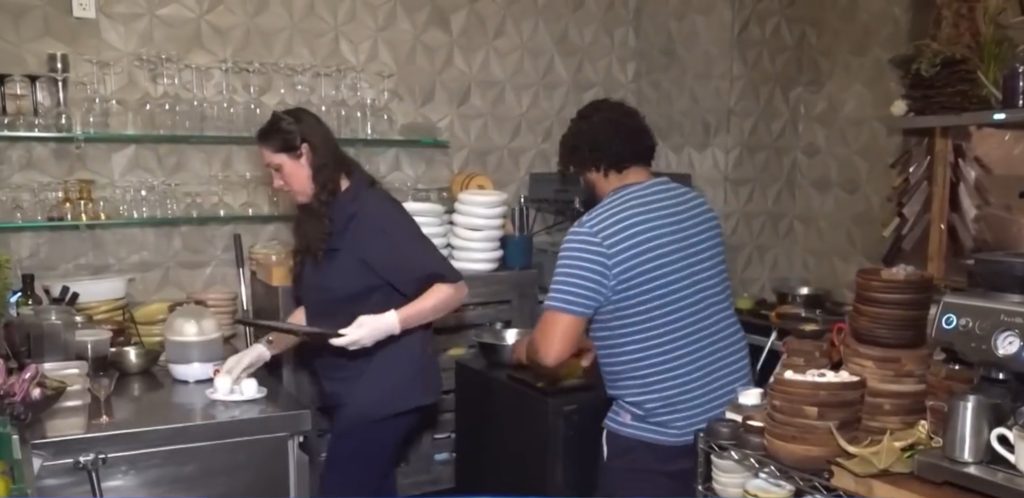At the ‘Honey Badger’ restaurant in Brooklyn, New York, Albanian-American Fjolla Sheholli and her husband, American entrepreneur Junayd Juman, offer a menu featuring wild foods and organic produce from local farmers. The couple aims to raise awareness among their customers about the importance of natural foods and environmental care.
In New York, there are thousands of restaurants, some of the most famous in the world. In this competitive sector, receiving critical recognition is not easy. ‘Honey Badger’ stands out among the many restaurants for its unique menu.
For nearly 10 years, this Brooklyn-based restaurant has been serving wild products—completely natural meats, vegetables, and fruits—sourced from small local farmers along the northeastern U.S., from the mountains of Maine to Pennsylvania.
The restaurant is run by entrepreneur Fjolla Sheholli, who came from Kosovo to the United States 21 years ago, and her husband, Junayd Juman, an entrepreneur originally from Trinidad.
Ms. Sheholli explains to Voice of America that her passion for wild foods is rooted in her childhood and the tough conditions families faced in Kosovo in the 1990s.
“When everyone lost their jobs, we had to either leave the country or adapt in different ways. The challenges we faced forced us to produce everything from scratch. We made our own cheese, butter, and meat to ensure we had supplies throughout the year. We always went hunting, fishing, and foraging for mushrooms and everything else from the mountains” says Ms. Sheholli.
Her husband, Mr. Juman, also emphasizes that eating wild-grown foods is a tradition in his family. “In Trinidad, we eat wild foods. We have farms, but we also have the jungle and its produce. So, wild foods are part of our culture. Some of the best foods in the world are wild fish, compared to farm-raised fish. The minerals found in wild products can’t be matched by others” he explains.
At ‘Honey Badger’ customers cannot order a specific dish but can enjoy 10 to 18 different seasonal courses, inspired by the diet of indigenous American tribes and combined with modern global cuisine.
“A lot of our foods are about well-being. It’s not just about taste, salty or sweet, but also the feeling you have after eating. A hamburger at the airport is the worst thing you can do to yourself. How the animal is treated by the farmer matters. Meat from factory animals is slave meat” says Mr. Juman.
Ms. Sheholli notes that many ingredients in her dishes were once used as medicine by Native American tribes, but today, she adds, they are difficult to find in markets.
“Indian-Americans have always been very connected to nature. Everything was linked to the moon’s phases. It’s true that when the moon is full, things happen differently. This is reflected in the variety of natural products. The entire culture of indigenous Americans is based on the moon. In fact, the foods they used had healing properties. For example, you take this because you feel a certain way, and another product is good for something else” she explains.
‘Honey Badger’ sources from three fishermen, five hunters, and 27 foragers who gather products from the wild. At this restaurant, the presentation of the plate is also crucial.
“Every plate must be delicious and beautiful. It has to have a wonderful story behind it that you can connect with. Many of our dishes are tied to childhood and our memories of the magic of food. I think chefs are the last magicians. We take wild ingredients from nature and transform them into something beautiful for you to eat” says Mr. Juman.
Ms. Sheholli emphasizes that ‘Honey Badger’ is not just a business but also a mission to raise awareness about the importance of eating natural products.
“Farmers have taken a very different path since the 1980s. Today, we don’t know where the food we consume comes from. The deeper I got into my research, I realized that diseases and everything we face come from consuming foods of unknown origin,” she says.
Ms. Sheholli adds that unhealthy practices and industrial agriculture are worsening global warming and threatening the planet by poisoning the soil and air./VOA








